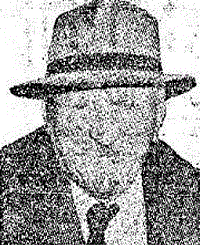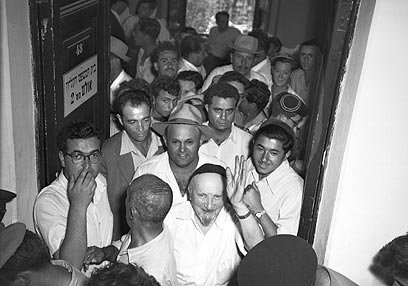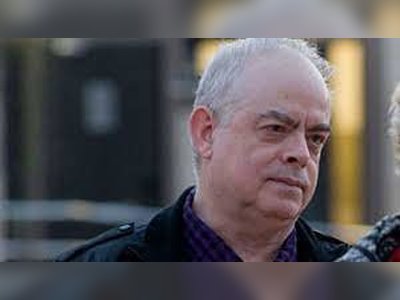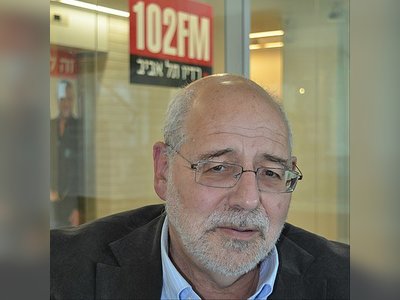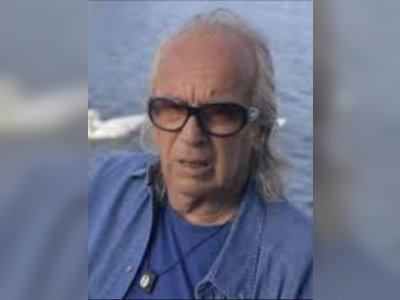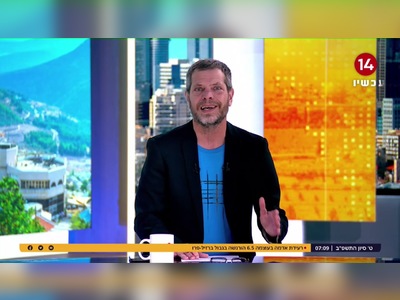Michael Greenwald
Was a Jerusalem-based publicist born in Hungary. He is known for the famous defamation trial brought against him in the case of Israel Kastner, who was a member of the Aid and Rescue Committee in Budapest during the Holocaust. In the trial, following an appeal, Greenwald was sentenced to conditional imprisonment.
Biography
Michael Greenwald was born in Sopron, then part of the Austro-Hungarian Empire, the son of Menachem Greenwald, the rabbi of the city. Upon graduating, he moved with his family to Vienna, where he opened a small ten-room hotel. Later, he served as a diplomat in the Empire. He attempted a career in journalism but was not successful.
In 1934, he published the newspaper "Mizrahi" in Vienna, in which he sharply criticized the members of the Histadrut, whom he referred to as "Reds." Regarding Yosef Bari, who was sent from Eretz Israel to Vienna, he wrote that he was sent by Berl Locker and Yitzhak Greenboim "to increase the Marxist hegemony in the Jewish Agency in a concealed manner."
In 1937, he fell victim to an anti-Semitic attack in which he was severely beaten, and his attackers abandoned him only after they believed him to be dead. In 1938, after recovering from his injuries, he immigrated to Eretz Israel with his wife, son, and daughter. He settled in Jerusalem, where he purchased a ten-room hotel on Zion Square with his savings and operated it together with his wife.
In May 1942, he was the Jerusalem correspondent for the "Special Newspaper." In 1943, he was sentenced to one year in prison for extortion, as he demanded 10 pounds as a condition for not publishing a person's name in the "Special Newspaper," but the verdict was canceled because the judge lacked authority.
Greenwald often expressed his opinions on public matters. In 1943, he contested the election of synagogue treasurers, appealed to the Rabbinical Court, and was fined for insulting the treasurers. In another case, he was fined 50 pounds for insulting a young woman.
Shlomo Aharonson wrote that in the file on Greenwald collected by the Shai and published, he was depicted as a spy who, while in Vienna, slandered Zionist activists and others who angered him to the authorities of the fascist regime. In the period of the mandate, he was an informant for the CID and claimed to them that immigrants intended for deportation should not be brought to Eretz Israel.
One of his brothers and many of his relatives perished in the Holocaust. The "Time" magazine found that the Nazis murdered more than 50 members of his family. Greenwald supported the Irgun organization. His son, Yitzhak Greenwald, was a member of the Irgun and fell in the War of Independence in the Battle of Mount Zion.
In the early 1950s, Greenwald began distributing a publication among his acquaintances and within the newspaper circles. This publication bore the name "Letters to Friends in the East [Internal]" and contained critical comments and interpretations of the situation in the country, as well as gossip and scandals from the lives of Jews in Budapest and Vienna.
In his publication, Greenwald often criticized the Mizrahi movement and other religious-nationalist parties, but above all, the Mapai Party, his political nemesis. After writing the publication in German, he looked for someone to translate it into Hebrew. He multiplied the publication by the hundreds, printed it, and sent it to his friends. Greenwald also criticized one of the factions that competed in the internal elections of the Mizrahi Workers' Party in 1952.
Sometimes Greenwald had to apologize for the things he published due to defamation lawsuits. For example, in December 1953, he published an apology to Moshe Kalmir, in which he wrote that his words were groundless.
In December 1956, his daughter committed suicide.
In 1962, he was convicted of making a false statement intended to increase the compensation he received from Germany, and he was fined 100 pounds.
Michael Greenwald passed away in March 1968.
State of Israel vs. Michael Greenwald
In August 1952, Greenwald, in his publication, attacked Dr. Israel Kastner, who was a member of the Aid and Rescue Committee in Budapest during the Holocaust.
In this role, Kastner had contacts with Adolf Eichmann and Kurt Becher, the head of the Economic Department of the SS, regarding the proposal to transfer Hungarian Jews outside the German-occupied territory in exchange for ten thousand trucks and other goods (a plan known as "Goods for Blood").
In 1952, Kastner served as the spokesperson for the Ministry of Industry and Commerce, headed by Minister Dov Yosef. Kastner was also a candidate for the second Knesset from the Mapai Party, in the 47th place on the list.
Greenwald dedicated an entire publication to the subject of Kastner. He accused him of collaborating with the Nazis and facilitating the death of Hungarian Jews during the Holocaust. In his article, Greenwald wrote: "For three years, I have been waiting for this moment to bring to justice this career criminal, who enjoyed Hitler's murderous deeds.
Based on conspiracies and collaboration with the Nazis [...] I see him as a murderer in disguise of my dear brothers [...]! For whom and on whose behalf did he secretly travel to Nuremberg to participate in the trial of the greatest war criminals in world history, this time as a representative of the Sanitary Company for the benefit of SS Standartenführer Kurt Becher, a murderer and robber who exploited our brothers in Hungary and sucked their blood?!".
In another passage, Greenwald wrote: "My dear friends, my dear Eastern friends, the stench of corpses scratches my nostrils, this will be the funeral of funerals. Dr. Rudolf Kastner must be eliminated."
The Mapai Party and the government were embarrassed by Greenwald's harsh accusations against Kastner, who was a Mapai member. They believed that a public figure could not continue in his role without responding to accusations like those made by Greenwald.
The government's legal advisor, Chaim Cohen, and Minister Dov Yosef, under whose ministry Kastner served, convinced Kastner to file a formal complaint against Greenwald because they believed that he could not continue in his role without responding to the accusations made by Greenwald.
The State Prosecutor's Office filed a criminal complaint against Greenwald for defamation, according to Section 201 of the Criminal Law Ordinance of 1936, for libelous speech. It was a rare case in which the State Prosecutor's Office filed a criminal complaint for slander, and not by the person or entity against whom the words were spoken.
President of the Jerusalem District Court, Judge Benjamin Halevy, reversed Greenwald's accusations against Kastner into accusations against Greenwald in four categories:
The trial began on January 1, 1954. Michael Greenwald was represented by young lawyer Shmuel Tamir, a member of the Irgun and one of the founders of the Herut movement. "The Witness for the Defense" represented Greenwald, with Joseph Sichtmann and Shmuel Marlin, and was headed by Haim Soudry, an actor.
In the lawsuit, Greenwald apologized to Kastner, and according to the agreed compromise, he was given the option to sign the apology without an admission of guilt. However, Greenwald refused to apologize in court and asked for a public trial. This was done in accordance with the law that applied to freedom of expression and the public's right to know.
Greenwald claimed that the state had harmed him by choosing not to provide him with classified documents from the Holocaust period, to which he was entitled as a defendant. Judge Halevy rejected Greenwald's arguments, including the claim that the law is unconstitutional and denied him the right to present evidence.
After several months, in which Judge Halevy read out the verdict in installments and heard witnesses, he convicted Greenwald in his ruling of June 22, 1955. According to the verdict, the judgment came on the basis of the assumption that Kastner did not collaborate with the Nazis, and he was therefore acquitted.
At the same time, the judge ruled that the term "collaboration" was not a legal term, and Greenwald did not know the facts. According to the verdict, Kastner was sentenced to a conditional sentence of six months' imprisonment for libelous speech, which was replaced by a fine of 200 Israeli pounds.
The verdict aroused great public and political resonance, both in favor of Greenwald and against him. In the Zionist Mapai Movement, many called to "eliminate" him.
Prime Minister David Ben-Gurion attacked Greenwald from the Knesset lectern, and other Mapai members attacked him in the media. Greenwald turned to the Supreme Court with a request for the verdict to be annulled. In September 1956, the Supreme Court reduced the sentence to a conditional one.
The trial left a significant mark in the history of the State of Israel and Jewish society and aroused deep political divisions. It was a central event in the public discourse in the State of Israel and in Zionist historiography, and it is remembered in research and public memory as "The Greenwald Affair" or "The Kastner Affair."
The trial is considered one of the key events in the history of freedom of the press in Israel and in the development of the concept of public right to know, and it was studied by legal scholars and historians.
- מלכיאל גרינוולדhe.wikipedia.org
